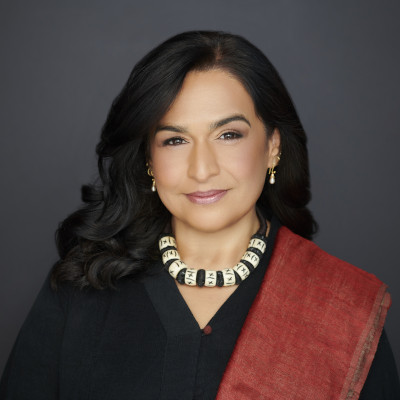College of Education and Human Development
Supriya Baily, Professor and Co-Director of the Center for International Education has Authored a Book Examining How a Fundamentalist Movement in India Has Affected Women’s Rights Over a 30-Year Span
February 18, 2025

Supriya Baily
Supriya Baily, professor and Co-Director of the Center for International Education within the College of Education and Human Development at George Mason University, recently published a book titled Bangalore Girls: Witnessing the Rise of Nationalism in a Progressive City. This book depicts the lived experiences of a group of 35 women who spent their formative years in Bangalore, India—a city they once considered cosmopolitan, inclusive, and secular growing up there as teenagers. As adults these same women came to view the city’s evolution moving towards a fundamentalist and nationalist movement that has diminished their rights and opportunities. In a series of interviews with Baily, the women share how their lives have changed during a span of thirty years following the 1992 destruction of the Babri Masjid Mosque in the northern Indian city of Ayodhya by religious zealots. This event, described by Baily as a “crystallizing moment,” precipitated widespread violence throughout India and resulted in the rise of the Bhartiya Janata Party (BJP).
The women featured in Baily’s book have known each other since their teen years when they attended school together in Bangalore. Their stories illustrate how over the course of thirty years, the progressive and secular features of Bangalore, a city known as the “Silicon Valley of India,” gave way to a political climate cloaked in extremism, nationalism, fundamentalism, anti-intellectualism, and misogyny. These changes have eroded many of the educational and professional opportunities once available to women living in Bangalore. Baily commented, “While this book does not paint a nostalgic and rosy picture of the past, it does seek to understand the present through the narrative of these 35 women who grew up in Bangalore. The women talk about the importance of education and critical hope as it pertains to pushing back against authoritarian regimes. Much of this book has connections to the current political environment that we see operating in many parts of the world and is an exploration of how quickly we can lose the rights that women have fought so hard to have access to.”
As the 30-year anniversary of the demolition of the Babri Masjid Mosque approached, Baily felt it was necessary to author a book that would raise awareness of the far-reaching fallout from this terrible act. She explained, “During those thirty years, we have seen the rise of nationalism in India which has affected women in a multitude of ways, including limiting their education and jeopardizing their safety and security. We have also witnessed the rise of anti-Muslim bias and a growing climate of anti-intellectualism. These developments have had a long-term negative impact in India and are the hallmarks of nationalist movements around the world.”
“This book,” Baily continued, “is an expression of what happens when nationalist ideologies remain embedded in the political environment over three decades and the impact that has on eroding public trust in institutions, fracturing the bonds of human connection, and promoting misogynistic views that seek to return women to more traditional forms of engagement in public and private spaces. I primarily authored this book due to the critical need to address such issues as nationalist movements have gained ground around the world.”
The book is divided into two parts with the first section focusing on the city of Bangalore and the memories of the women who watched the rise of the BJP nationalist political party over the last thirty years. The second part of the book examines the negative impacts which the doctrine practiced by the BJP has had on issues affecting women including safety and security, education, intellectualism, politics and policies, and secularism in communal harmony. Baily states, “The narratives from the women featured in the book help us understand both the local and global nature of these critical issues.”
Baily elaborated on the impact of these issues. She stated, “Around the world, women and girls have faced an increase in misogynistic practices, as well as the re-entrenchment of patriarchal norms in countries and cultures as diverse as Brazil, Russia, the Netherlands, Bangladesh, and the United States. Women and girls have faced a rising backlash against their ability to access education, ensure safe working conditions, and benefit from policies and practices that support their engagement in more equitable practices. The experiences of the women in this book illustrate the ways in which political policies that are centered around nationalism, religion, fundamentalism, and patriarchy operate in ways that limit their access, and infringe on their rights.”
The issues which Baily addresses in the book are those to which she has devoted much of her research throughout her career. Baily emphasized, “My research has centered around women’s empowerment and girls and women’s rights. I have looked at how women in rural areas have sought to use economic development as ways to exercise agency and I have explored how local elected female officials engage with constituents as ways to use their own voice to support issues that matter to them. This book is a natural outcome of this research and is meant for a general reader for whom academic research is sometimes inaccessible.”
Baily concluded her remarks by offering her thoughts on what message she hopes people will take away after reading her book. She stated, “While this is a book about Bangalore, it is a book meant for a general reader who cares deeply about politics, women’s experiences, and the impact that nationalism has had over a period spanning three decades. The experiences that the women explore are meant to draw attention to patterns that are spreading in other countries, as we seek to think about who is most motivated to support authoritarian leaders, the ways in which political institutions are set up to support the status quo, and what might be done to engage in progressive, humanist, and inclusive rights for all.”
The book is available in both print and digital format and may be ordered by visiting the publisher website or through online booksellers including Amazon.
